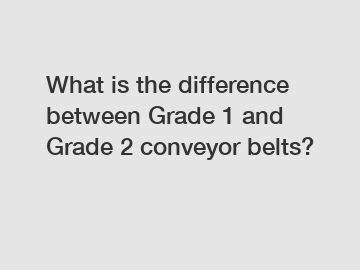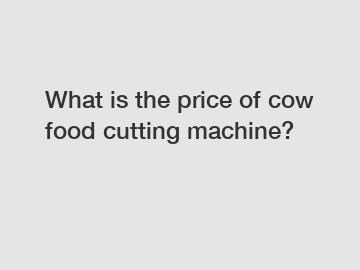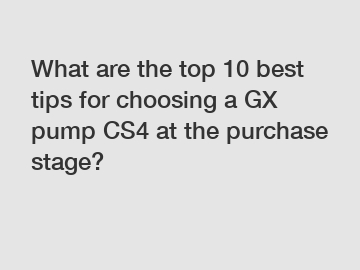What is the difference between Grade 1 and Grade 2 conveyor belts?
What is the difference between Grade 1 and Grade 2 conveyor belts?
Conveyor belts are an essential component in various industries, facilitating the efficient movement of materials and products. When it comes to choosing the right conveyor belt, several factors should be considered, including the belt grade. Different grades of conveyor belts offer varying levels of durability, strength, and resistance to specific conditions. Two common grades, Grade 1 and Grade 2, are often compared. In this article, we will explore the differences between these two grades and understand their applications in the industry.
1. Belt Strength:

Grade 1 conveyor belts are known for their exceptional tensile strength, making them suitable for heavy-duty applications. These belts can handle high weights and perform remarkably under demanding conditions. On the other hand, Grade 2 conveyor belts are designed for slightly lighter loads. While they may not possess the same level of strength as Grade 1 belts, they are still durable and can handle moderate loads efficiently.
2. Material Durability:
Another crucial aspect to consider when selecting a conveyor belt is the durability of the material. Grade 1 conveyor belts are typically manufactured using robust materials that offer excellent resistance to wear, tear, and impacts. They are built to withstand harsh working environments and are often used in industries such as mining, construction, and heavy manufacturing. Conversely, Grade 2 conveyor belts are constructed with materials that provide adequate durability for less-demanding applications, usually found in industries such as food processing, packaging, and light manufacturing.
Additional resources:Snowpeak manual pump: 10 best tactics for maximizing efficiency?
Revolutionizing TDR Testing: A Game Changer?
Ultimate Guide to Radiation Measurement: FAQs, Trends & Tips
What must you never try and cut on the laser cutters?
What are the top 5 reasons to choose Yanmar 4TNV106 for your business purchase?
Are Vertical Low Temperature Storage Tanks Safe?
Revolutionizing fashion with sparkly metal dust?
3. Resistance to Abrasion and Cuts:
Grade 1 conveyor belts excel in their resistance to abrasion and cuts. They are specifically engineered to withstand the harsh abrasion caused by coarse materials, making them ideal for industries where sharp-edged materials, such as rocks or metallic ores, are being transported. Grade 2 conveyor belts, although still designed to offer resistance, may not have the same level of resilience when it comes to abrasive materials. As a result, they are more suitable for conveying lighter items that are less likely to cause significant damage to the belt's surface.
4. Cost and Economic Considerations:
While Grade 1 conveyor belts are undoubtedly more robust and durable, they often come with a higher price tag. This makes them a preferred choice for heavy-duty applications where the belt will be subjected to extreme conditions. Grade 2 conveyor belts, comparatively more cost-effective, are an excellent choice for industries that require efficient material handling without necessarily dealing with heavy loads or highly abrasive materials.
In conclusion, the difference between Grade 1 and Grade 2 conveyor belts lies primarily in their strength, durability, resistance to abrasion and cuts, as well as their cost. Grade 1 belts are designed for heavy-duty applications, offering exceptional strength and durability, while Grade 2 belts are suitable for lighter loads and less abrasive materials. Ultimately, the choice between the two grades depends on the specific application and the requirements of the industry. By understanding these differences, businesses can make an informed decision when selecting the most suitable conveyor belt for their operations.
Are you interested in learning more about Aoyuan Rubber Machine Belt, Aoyuan Rubber Machine Belt, Aoyuan Rubber Machine Belt? Contact us today to secure an expert consultation!
Additional resources:Best motorized wheel options for industrial equipment purchase?
Top 10 tips for purchasing a 6 Ton Electric Tow Tractor?
Comparing Pet Recycling Machines and Tire Shredder Machines
Upgrade Your 4U Chassis with Fan Disks
Bar Straightener: What Are The Top Strategies To Get The Best Deal On A Bar Straightener?
Revolutionizing Blowout Preventers: Are They Truly Safe?
What is the most efficient induction coil design?
228
0
0
Related Articles
-
What is the price of cow food cutting machine?
Are you a farmer looking to invest in a cow food cutting machine but unsure about the price?
169
0
0
-
Water Bottle Blowing Machine Price: Your Top Questions Answered!
Water Bottle Blowing Machine Price: Your Top Questions Answered!
209
0
0
-
180
0
0
-
179
0
0
-
196
0
0
-
192
0
0
-
How to choose the best Board Loader for ultimate purchase satisfaction?
How to choose the best Board Loader for ultimate purchase satisfaction?
164
0
0
-
Revolutionizing Construction: Electric Excavators in Romania
Revolutionizing Construction: Electric Excavators in Romania.
184
0
0









Comments
All Comments (0)